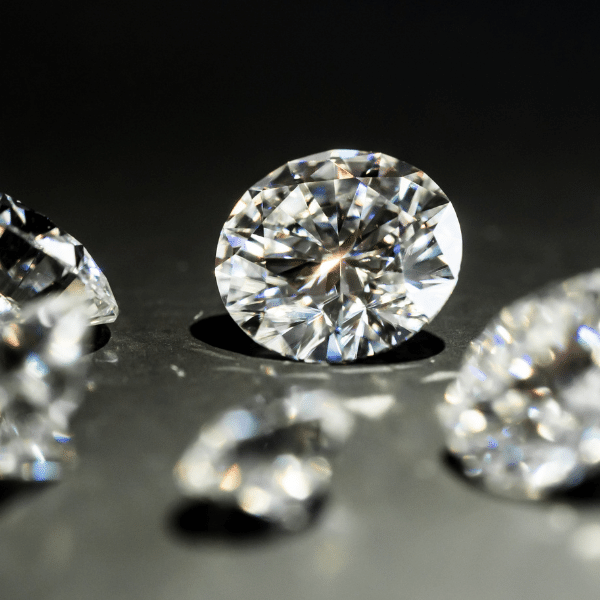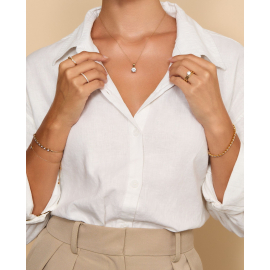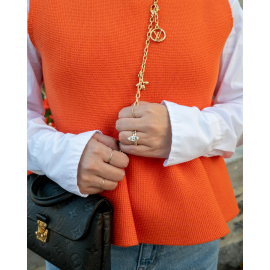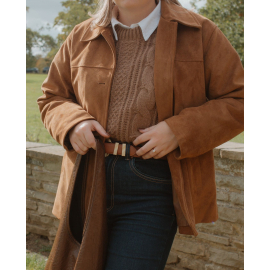What is Moissanite?

Moissanite is a beautiful gemstone with some out-of-this-world origins. Not naturally found on Earth, moissanite was originally discovered in the 1800s and is brought down on meteorites and asteroids. At first, it was mistaken for diamonds because of its clear colour and sparkling depths. Because it’s mostly found in meteorite craters and impact sites, natural moissanite is incredibly rare and therefore almost all moissanite jewellery uses gems that are made in a lab.
Due to the clear stones and excellent durability, moissanite is a gorgeous alternative to diamonds and offer incredible versatility and rainbow-hued sparkle.
Moissanite vs Diamonds differences

Despite their similarities in appearance, there are a number of differences between diamonds and moissanite.
Chemical make-up
The first difference is chemical. Diamonds are made from pure carbon that has been put through incredibly high pressure and heat - whether under the Earth’s surface or in a simulated setting in a lab. Moissanite is a result of silicon carbide, a compound made from silicon and carbon, going through the same process.
Colour
Although they look extremely similar, moissanite and diamonds do differ in colour. Despite it’s first impression, moissanite is not totally colourless and, unlike diamond, is not assessed and graded on colour. Typical moissanite is similar in colour to a GIA-certified K-colour diamond, meaning that it would fall on the ‘faint colour’ scale.
Hardness
Moissanite is slightly softer than diamond on the Mohs scale of hardness. Diamond is the hardest known mineral and is ranked at 10 whereas moissanite ranks at 9.25. However, compared to emerald or opal, 7.5 or 6 respectively, moissanite is still an extremely durable and robust gemstone that won’t be scratched or damaged by everyday wear.
Brilliance
Brilliance refers to how much light reflects from a gemstone to create sparkle. A diamond with an ideal cut will have the highest level of brilliance, as it is cut in a way to reflect as much light as possible. Moissanite is faceted differently from a diamond, which causes less white light to refract, however, a moissanite will produce stronger, more colourful flashes of light.
Clarity
Diamond clarity refers to the assessment of imperfections internally and externally of a given stone. Moissanite generally has a higher clarity than diamond because it is created in a lab whereas a natural diamond is formed with many unknown circumstances. It is common for natural diamonds to have inclusions and blemishes, whereas moissanite has very few.
Price
Moissanite has a lower price point than diamond. This is great if you’re looking for a piece of jewellery on more of a budget, however, it does mean that moissanite doesn’t hold the same value that diamond does which isn’t so good if you’re looking to make an investment in an item that retains its value.
Other Affordable Diamond Alternatives

If you or your loved one are concerned about the ethics of diamonds, then moissanite is an excellent alternative. Because it's grown in a lab, it requires no mining - which can have a bad reputation - and is more affordable than natural diamonds.
Another option is ethically mined diamonds. Our diamonds are ethically sourced and are purchased from recognised diamond trading centres around the world, committed to trading ethical diamonds, in line with various global institutions and the Kimberley Process Certification Scheme.
Alternatively, lab-grown diamonds are also an excellent option that is very affordable and ensures the jewellery retains its value for years to come. Learn more about our lab-created diamonds to discover why they might be the best option for you.
How to buy Moissanite Jewellery

So you’ve decided on moissanite as the ideal stone for your engagement ring, what are the next steps to securing your ring, and your engagement?
When you’re buying a diamond, you are usually directed to consider the 4 Cs: colour, cut, clarity, & carat. When shopping for moissanite, however, these 4 Cs don’t all apply in the same way.
The 4 Cs help to determine the quality and price of a gemstone. They are:
Colour - the natural hue, or lack thereof, of a stone. The less colour, the higher the value.
Cut - The balance of proportion, symmetry, and polish achieved by the gemstone cutter. A gem with an ideal cut will reflect light better, giving it that all-important sparkle.
Clarity - How clean or clear a gemstone is. Internal characteristics are known as inclusions whereas surface characteristics are referred to as blemishes.
Carat - The traditional measuring unit of gemstones. A 1-carat diamond weighs 200 milligrams however as moissanite stones are between 15-18% lighter than diamonds, a 1-carat moissanite will appear larger than a 1-carat diamond.
Step 1: Work out your budget
The first step to shopping for a piece of moissanite jewellery is to work out your budget. Traditionally it has been said that you should spend 2-3 months salary on a ring. Nowadays, however, this figure is much more flexible.
Rather than trying to save a full 3 months worth of salaries before you’re able to propose, use of our engagement ring calculator to work out how much you can reasonably afford to spend.
Step 2: Choose the style
Choosing “the ring” should be a truly personal experience. Make sure you take your partner’s fashion sense and hobbies into consideration when choosing a ring as certain things, such as wearing gloves or being active, may affect the jewellery they will wear.
It is also a good idea to take note of what jewellery your partner already wears. For someone who doesn’t wear a lot of jewellery, something classic and simple such as a solitaire setting may be enough whereas someone who wears lots of rings may prefer to wear something more stand-out like a cluster ring.
Step 3: Find the right size
Next, you’ll want to make sure the ring fits. We know that not everyone knows their ring size - and that’s ok! There are a few different ways you can find the perfect ring size for you or your partner so make sure you read through all your options on our Ring Size guide.
But if you do happen to accidentally pick the wrong size, Diamonds Factory offer a free 30-day resizing service to ensure it fits perfectly.
Step 4: Choose the design

Ring setting
The setting describes how gemstones are set, or mounted, into a metal band and aims to fully highlight the beauty of the gemstone. and can be one of the first things that someone notices about the ring.
Stone shape
The stone shape is the physical shape of the stone in the ring. The shape can affect the brilliance of some stones and some shapes suit different hands. For example, a baguette-shaped stone will make fingers look longer while a circular stone may suit dainty hands better than an oval one.
Precious metal
The third design aspect to consider is the precious metal the band is made of. If your significant other only wears jewellery of a specific colour, make sure the metal you choose for the ring matches. For example, if they only wear silver jewellery, try to opt for a platinum, white gold, or silver band to match.
Shop engagement rings to customise the different design options to your preference.
Moissanite jewellery

Not just limited to moissanite engagement rings, Diamonds Factory have a wide range of moissanite jewellery to choose from. Whether you’re looking for an extra special gift or just want to treat yourself, you can find a range of Moissanite Pendants and Moissanite Earrings in our gorgeous collection.
How to care for moissanite jewellery

Just like diamonds, moissanites will not tarnish or lose their durability or colour over time. They will not get cloudy or lose their brilliance, and you’ll never need to worry about them looking any less than spectacular.
You will, however, need to care for your moissanite engagement ring the same way you would for a diamond ring. To do so, simply fill a shallow bowl with soapy water (a mild dish soap is a great choice), place the bowl on a solid surface away from plug holes or drains, and soak your ring for about 15 minutes. Next, use a soft-bristled toothbrush to remove any dirt. Finally, dry your moissanite ring well with a paper towel or microfibre cloth and it will look good as new. You can clean your moissanite as often as you would any diamond.
FAQs
Should I insure moissanite jewellery?
Just like with any other piece expensive jewellery, you will probably want to get your moissanite ring insured. Some jewellery is included in your contents insurance up to a certain value but for peace of mind it’s best to insure your engagement ring seperately using specialist insurance policies.
We have an engagement ring insurance service that specialises in keeping your precious jewellery safe.
Is moissanite durable?
Yes! Because of its 9.25 rating on the Mohs scale of hardness, moissanite is one of the most durable gemstones on the market. It’s suitable to wear every day and won’t become scratched by most everyday objects and activities.
Should I buy a moissaninte engagement ring or a diamond ring?
The answer to this question is purely down to personal preference. If you’re looking to save a bit of money, or your significant other is particularly interested in eco-friendly gemstones, moissanite might be a great option. However, if you’re looking for the luxury only diamonds can offer, you’ll also find a wonderful range of ethically sourced and lab-grown diamonds from Diamonds Factory.
Does moissanite lose it’s sparkle over time?
Moissanite will not lose its sparkle as time passes. The clarity and color of the stone won’t change through the years but, just like with any piece of jewellery, dirt and grime are the only aspects that may inhibit a ring’s sparkle on a day-to-day basis. However, just like any stone, any damage to the ring’s surface can inhibit sparkle, so it’s important to care for it properly.









What is Moissanite?
Moissanite is a beautiful gemstone with some out-of-this-world origins. Not naturally found on Earth, moissanite was originally discovered in the 1800s and is brought down on meteorites and asteroids. At first, it was mistaken for diamonds because of its clear colour and sparkling depths. Because it’s mostly found in meteorite craters and impact sites, natural moissanite is incredibly rare and therefore almost all moissanite jewellery uses gems that are made in a lab.
Due to the clear stones and excellent durability, moissanite is a gorgeous alternative to diamonds and offer incredible versatility and rainbow-hued sparkle.
Moissanite vs Diamonds differences
Despite their similarities in appearance, there are a number of differences between diamonds and moissanite.
Chemical make-up
The first difference is chemical. Diamonds are made from pure carbon that has been put through incredibly high pressure and heat - whether under the Earth’s surface or in a simulated setting in a lab. Moissanite is a result of silicon carbide, a compound made from silicon and carbon, going through the same process.
Colour
Although they look extremely similar, moissanite and diamonds do differ in colour. Despite it’s first impression, moissanite is not totally colourless and, unlike diamond, is not assessed and graded on colour. Typical moissanite is similar in colour to a GIA-certified K-colour diamond, meaning that it would fall on the ‘faint colour’ scale.
Hardness
Moissanite is slightly softer than diamond on the Mohs scale of hardness. Diamond is the hardest known mineral and is ranked at 10 whereas moissanite ranks at 9.25. However, compared to emerald or opal, 7.5 or 6 respectively, moissanite is still an extremely durable and robust gemstone that won’t be scratched or damaged by everyday wear.
Brilliance
Brilliance refers to how much light reflects from a gemstone to create sparkle. A diamond with an ideal cut will have the highest level of brilliance, as it is cut in a way to reflect as much light as possible. Moissanite is faceted differently from a diamond, which causes less white light to refract, however, a moissanite will produce stronger, more colourful flashes of light.
Clarity
Diamond clarity refers to the assessment of imperfections internally and externally of a given stone. Moissanite generally has a higher clarity than diamond because it is created in a lab whereas a natural diamond is formed with many unknown circumstances. It is common for natural diamonds to have inclusions and blemishes, whereas moissanite has very few.
Price
Moissanite has a lower price point than diamond. This is great if you’re looking for a piece of jewellery on more of a budget, however, it does mean that moissanite doesn’t hold the same value that diamond does which isn’t so good if you’re looking to make an investment in an item that retains its value.
Other Affordable Diamond Alternatives
If you or your loved one are concerned about the ethics of diamonds, then moissanite is an excellent alternative. Because it's grown in a lab, it requires no mining - which can have a bad reputation - and is more affordable than natural diamonds.
Another option is ethically mined diamonds. Our diamonds are ethically sourced and are purchased from recognised diamond trading centres around the world, committed to trading ethical diamonds, in line with various global institutions and the Kimberley Process Certification Scheme.
Alternatively, lab-grown diamonds are also an excellent option that is very affordable and ensures the jewellery retains its value for years to come. Learn more about our lab-created diamonds to discover why they might be the best option for you.
How to buy Moissanite Jewellery
So you’ve decided on moissanite as the ideal stone for your engagement ring, what are the next steps to securing your ring, and your engagement?
When you’re buying a diamond, you are usually directed to consider the 4 Cs: colour, cut, clarity, & carat. When shopping for moissanite, however, these 4 Cs don’t all apply in the same way.
The 4 Cs help to determine the quality and price of a gemstone. They are:
Colour - the natural hue, or lack thereof, of a stone. The less colour, the higher the value.
Cut - The balance of proportion, symmetry, and polish achieved by the gemstone cutter. A gem with an ideal cut will reflect light better, giving it that all-important sparkle.
Clarity - How clean or clear a gemstone is. Internal characteristics are known as inclusions whereas surface characteristics are referred to as blemishes.
Carat - The traditional measuring unit of gemstones. A 1-carat diamond weighs 200 milligrams however as moissanite stones are between 15-18% lighter than diamonds, a 1-carat moissanite will appear larger than a 1-carat diamond.
Step 1: Work out your budget
The first step to shopping for a piece of moissanite jewellery is to work out your budget. Traditionally it has been said that you should spend 2-3 months salary on a ring. Nowadays, however, this figure is much more flexible.
Rather than trying to save a full 3 months worth of salaries before you’re able to propose, use of our engagement ring calculator to work out how much you can reasonably afford to spend.
Step 2: Choose the style
Choosing “the ring” should be a truly personal experience. Make sure you take your partner’s fashion sense and hobbies into consideration when choosing a ring as certain things, such as wearing gloves or being active, may affect the jewellery they will wear.
It is also a good idea to take note of what jewellery your partner already wears. For someone who doesn’t wear a lot of jewellery, something classic and simple such as a solitaire setting may be enough whereas someone who wears lots of rings may prefer to wear something more stand-out like a cluster ring.
Step 3: Find the right size
Next, you’ll want to make sure the ring fits. We know that not everyone knows their ring size - and that’s ok! There are a few different ways you can find the perfect ring size for you or your partner so make sure you read through all your options on our Ring Size guide.
But if you do happen to accidentally pick the wrong size, Diamonds Factory offer a free 30-day resizing service to ensure it fits perfectly.
Step 4: Choose the design
Ring setting
The setting describes how gemstones are set, or mounted, into a metal band and aims to fully highlight the beauty of the gemstone. and can be one of the first things that someone notices about the ring.
Stone shape
The stone shape is the physical shape of the stone in the ring. The shape can affect the brilliance of some stones and some shapes suit different hands. For example, a baguette-shaped stone will make fingers look longer while a circular stone may suit dainty hands better than an oval one.
Precious metal
The third design aspect to consider is the precious metal the band is made of. If your significant other only wears jewellery of a specific colour, make sure the metal you choose for the ring matches. For example, if they only wear silver jewellery, try to opt for a platinum, white gold, or silver band to match.
Shop engagement rings to customise the different design options to your preference.
Moissanite jewellery
Not just limited to moissanite engagement rings, Diamonds Factory have a wide range of moissanite jewellery to choose from. Whether you’re looking for an extra special gift or just want to treat yourself, you can find a range of Moissanite Pendants and Moissanite Earrings in our gorgeous collection.
How to care for moissanite jewellery
Just like diamonds, moissanites will not tarnish or lose their durability or colour over time. They will not get cloudy or lose their brilliance, and you’ll never need to worry about them looking any less than spectacular.
You will, however, need to care for your moissanite engagement ring the same way you would for a diamond ring. To do so, simply fill a shallow bowl with soapy water (a mild dish soap is a great choice), place the bowl on a solid surface away from plug holes or drains, and soak your ring for about 15 minutes. Next, use a soft-bristled toothbrush to remove any dirt. Finally, dry your moissanite ring well with a paper towel or microfibre cloth and it will look good as new. You can clean your moissanite as often as you would any diamond.
FAQs
Should I insure moissanite jewellery?
Just like with any other piece expensive jewellery, you will probably want to get your moissanite ring insured. Some jewellery is included in your contents insurance up to a certain value but for peace of mind it’s best to insure your engagement ring seperately using specialist insurance policies.
We have an engagement ring insurance service that specialises in keeping your precious jewellery safe.
Is moissanite durable?
Yes! Because of its 9.25 rating on the Mohs scale of hardness, moissanite is one of the most durable gemstones on the market. It’s suitable to wear every day and won’t become scratched by most everyday objects and activities.
Should I buy a moissaninte engagement ring or a diamond ring?
The answer to this question is purely down to personal preference. If you’re looking to save a bit of money, or your significant other is particularly interested in eco-friendly gemstones, moissanite might be a great option. However, if you’re looking for the luxury only diamonds can offer, you’ll also find a wonderful range of ethically sourced and lab-grown diamonds from Diamonds Factory.
Does moissanite lose it’s sparkle over time?
Moissanite will not lose its sparkle as time passes. The clarity and color of the stone won’t change through the years but, just like with any piece of jewellery, dirt and grime are the only aspects that may inhibit a ring’s sparkle on a day-to-day basis. However, just like any stone, any damage to the ring’s surface can inhibit sparkle, so it’s important to care for it properly.